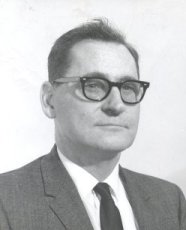W. Lee Mertz Biography
by Kevin E. Heanue
 |
| W. Lee Mertz Director, Office of Highway Planning |
W. Lee Mertz, an Oregon native, grew up on his family's remote farm miles from the nearest neighbors. The family transportation in his early years was a horse and wagon. He often said his appreciation for good transportation originated in those days when he saw crops that could not be sold because of the difficulty of getting them to market. Because there were no schools within a reasonable travel distance from the farm, Lee was home-schooled by his mother.
He was always an eager learner and was fascinated by anything mechanical or technical. While still in his teens, Lee arranged to take flying lessons. During the buildup to World War II, he flew new military planes to Europe under the lend-lease program. With the declaration of war in December 1941, he joined the U.S. Army Air Corps and continued as a pilot ferrying planes to Europe.
After the war, Lee used the GI Bill to earn a civil engineering degree in 1949 from what was then Kansas State College, joining the U.S. Bureau of Public Roads on graduation. When he completed the 3-year training program, he participated in several road test projects and then, finding his true calling, began a series of assignments that brought him to national prominence in transportation planning. He was an early computer programmer and a pioneer in the use of large computers to process travel survey information and simulate travel using mathematical models.
Because of his technical proficiency, Lee was selected in the mid-1950's to head the Regional Highway Planning Committee for the Washington, D.C. area. In that role, he helped develop the region's Interstate System and assisted the National Capital Transportation Agency, the forerunner of Washington Metropolitan Area Transit Authority, in developing the rail transit plans for the area. In 1962, he became the Technical Director for the Connecticut-New York-New Jersey Tri-State Transportation Commission, the transportation planning organization for the New York City region.
He returned to FHWA in 1969 as Chief of the Urban Planning Division. In 1973, he became Associate Administrator for Policy, a political position he held through the remainder of the Nixon Administration and the 2 years of the Ford Administration. After leaving his political position under President Jimmy Carter, Lee returned to the civil service, working on a coal haul roads study and a new edition of the highway cost allocation study, eventually becoming Director of the Office of Policy.
Thus, the rural farm boy had become one of the foremost urban transportation planners in the country.
After his office completed the cost allocation study, Lee stepped down as Director and devoted the remaining 3 years of his career to studying the highway of the Interstate System. "I had always wanted to find out how things really happened. So I thought, why don't I just do it?" With help from writer-editor Joyce Ritter, he compiled two major documents that have never been published, one on the origins of the Interstate System, and the other on the issues that affected the early years of construction through the mid-1970s. He also prepared a shorter report on the Bragdon Committee, an interesting footnote to the Eisenhower years. These documents present the unique perspective of contemporary voices addressing the issues of the day. They are now presented on-line for the first time.
W. Lee Mertz remained with the FHWA until retiring in 1988. During his career, Lee was always a mentor to younger generations of transportation professionals. He was eager to share any new insights or solutions to transportation problems or most any problem--his expertise was very broad. He was a born teacher. He would rarely answer a difficult question directly, particularly if it came from junior staff. He would pause and require the questioner to break the question into component parts, taking particular delight when the person answered his or her own question. Most Monday mornings, there would be a line at his desk of people who wanted help in determining how to repair a car or fix an appliance. The line then transitioned to people with transportation problems.
He died on April 9, 1993, at his home in Vienna, Virginia. His papers, known as the Mertz Collection, are maintained in the Special Collections and Archives at George Mason University in Arlington, Virginia.

